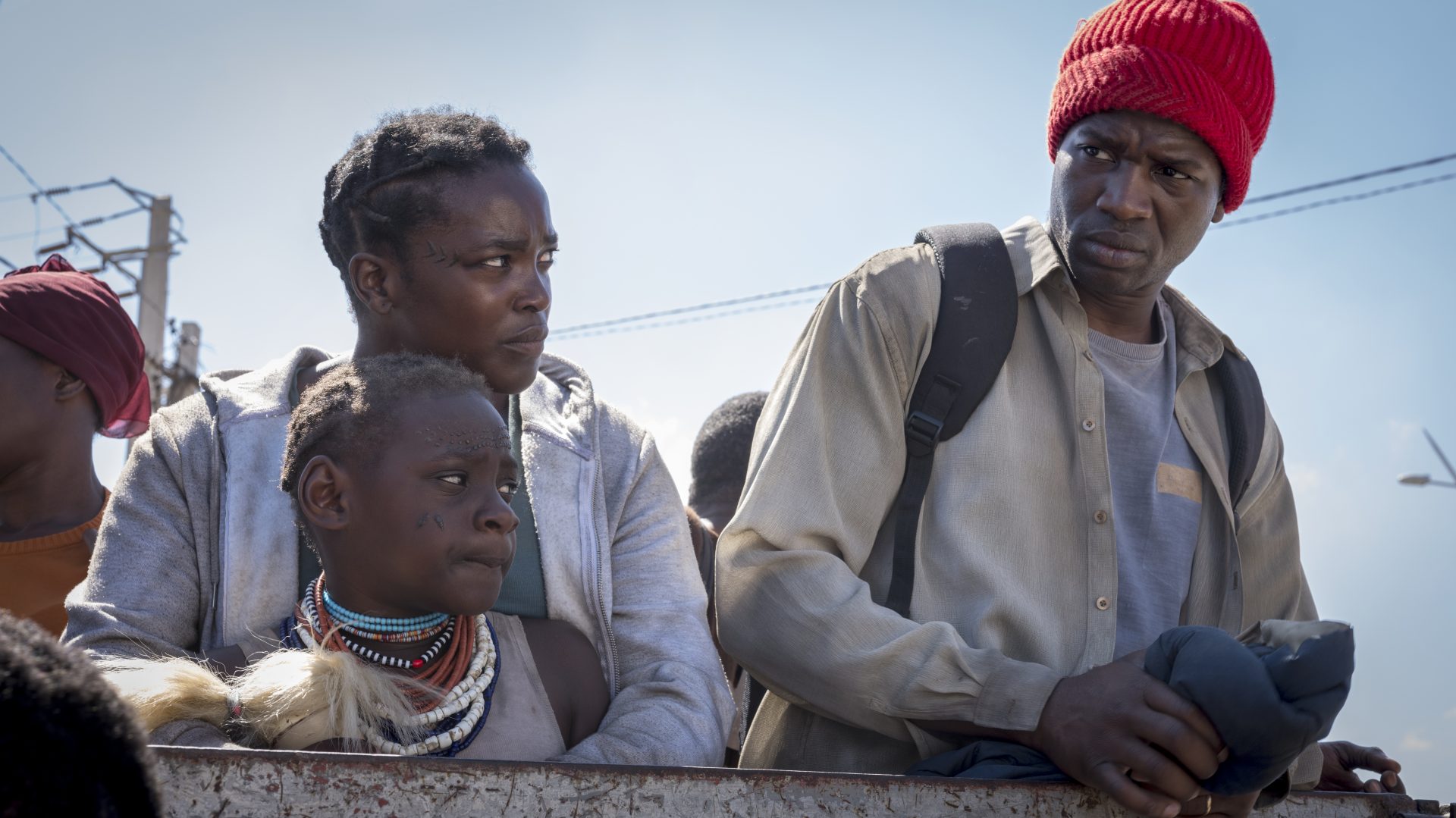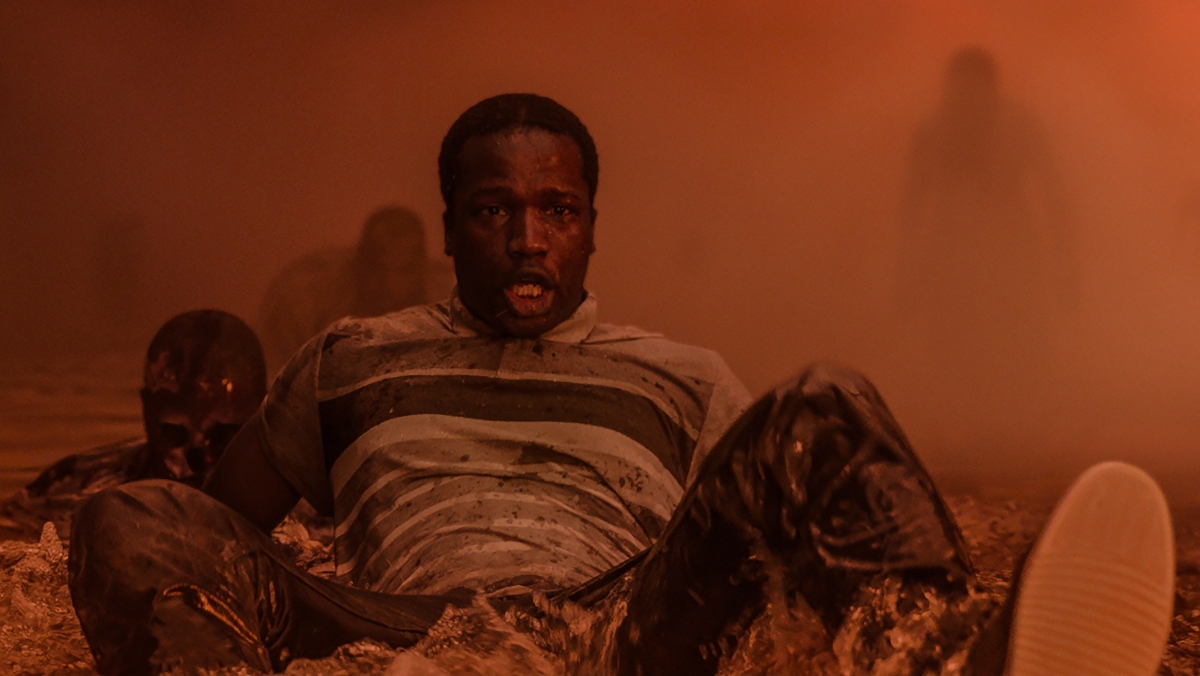Why don’t you just leave? It’s the quintessential question for anyone caught up in a haunted house horror tale. Viewers think (or even shout) it while diving into a horror movie or watching real-life ghost stories on television. The idea of simply leaving the evil behind seems to be the most logical solution, right? But sometimes there is a story and a profound realization that can only come through facing things head on. Writer and director Remi Weekes’ brave and haunting film His House is an exploration of horror manifesting itself through immense trauma, repressed guilt, and the loss and reclamation of one’s agency in a surreal space.
The British thriller follows Bol (Ṣọpẹ́ Dìrísù) and Rial Majur (Wunmi Mosaku), a Sudanese couple seeking asylum in the U.K. His House slowly unravels details about their treacherous journey from their war-torn native country to an unfamiliar place. The couple’s relationship carries the heavy weight of trauma and guilt over a profound loss. They are given a temporary pass to stay until their asylum approval; however, it’s made clear that they are far beneath citizens.
Bol and Rial get a meager weekly stipend along with a large yet decrepit apartment on the outskirts of town. They also receive a list of rules forbidding them to work, socialize in their space, or do pretty much anything that will make them feel at home. The couple must be humble, grateful, and “act right,” lest they want to be sent back to their home country. This dehumanizing and othering treatment adds additional pressure to a relationship weighed down by trauma.

Aidan Monaghan/Netflix
It doesn’t take long to realize that something disturbing is lurking in the hallways and walls of their new house. The unsettling ghosts and figures makes you want to look away, but it feels physically impossible. While a lot of haunted home stories involve a tragic backstory predating the current occupants, this immediately feels tied specifically to the couple.
A series of rapid and frequent jump scares creates a chasm between Rol and Rial. Dìrísù infuses Bol with a haunting state of paranoia and fear, while Mosaku’s blend of muted fear and boldness offers an intriguing juxtaposition. They also stand on two sides of the fence as immigrants. Bol desperately wants acceptance while Rial feels they will be perpetual outsiders.
In a pivotal scene, Rial and Bol sit by a flickering candle as they eat dinner. Rial tells the story of an honorable yet poor man who made immoral decisions to gain a new home. The man was driven to self-destruction by supernatural forces because of his choices. Her story’s reflection of their lives unravels itself in the film’s final act as the last of many unexpected directional changes with the story.
It speaks to how moral lines can be crossed in the name of survival and how a victim must reconcile those decisions. Rial and Bol are still undoubtedly survivors who, by all accounts, are “good” people. But, even “good” people do “bad” things if their backs are against a proverbial wall.
His House travels into familiar nightmarish territory with creaks, bumps, and strikingly scary images that occur at truly unexpected moments. The protagonists’ approach to understanding the entities’ intentions and confronting them feels incredibly fresh. The film shifts between supernatural horror and the couple’s compounding trauma and desperation swiftly without losing its core messages. There’s the clear commentary on racial microaggressions, anti-immigration sentiments, and how “all skinfolk ain’t kinfolk.”

Aidan Monaghan/Netflix
There’s often this idea that racism is somehow less pervasive in the U.K. versus the U.S. But this movie boldly affirms that anti-Blackness and nationalist beliefs are global. Rial experiences this as a well-meaning white woman comments on her tribal skin markings, which connect to Rial’s violent past. She’s weary of white people but becomes the subject of mockery by Black Brits too. For Rial, the concept of ghosts doesn’t compare to the horrors of living people.
“After all we’ve endured, after what we have seen, what men can do, you think it is bumps in the night that frighten me? You think I can be afraid of ghosts?”
A creepy white neighbor asks Bol why he doesn’t leave. The neighbor speaks directly about his family’s presence in the U.K., but this question carries unintended double meaning. Yes, they have a righteous fear of returning home and/or succumbing to the horrors in this home. There is no way for them to tell the truth and no resources to simply leave.
Bol and Rial would not leave and even if they could; it would not solve the compounding emotions triggering this nightmare. They have to process the full ramifications of a shocking choice in their own individual and collective ways. Bol must realize that he cannot simply move past it and move on—it must live with him forever.
Rial keeps looking back at her inability to protect others and wishes to run back home but there’s nothing there for her. There is no easy “fix” or solution for this problem. In fact, it leads to the couple having their share of tense moments before finally making choices to confront their monsters. The ending itself even leans in a different direction with a level of acceptance, self-empowerment, and a realization that the ghosts of our pasts will always exist of the periphery of our future.
His House is a creative examination of what it takes to survive and to become new with an emotional, thrilling, and truly unique take on well-trodden ground.
5/5
Featured Image: Aidan Monaghan/Netflix